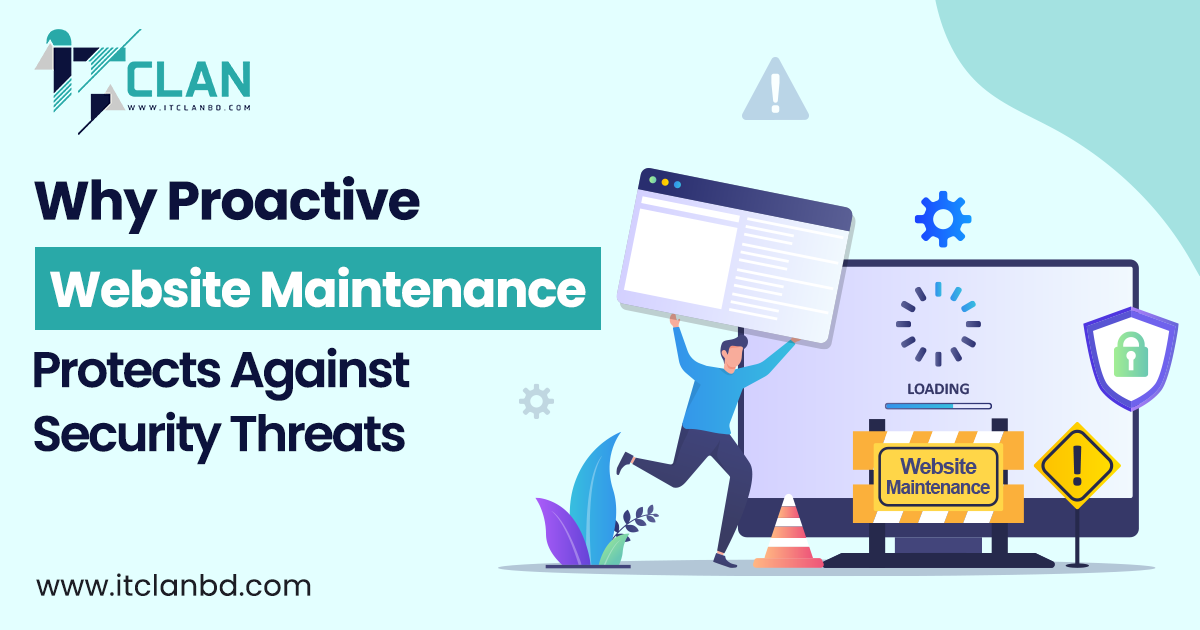
Our Blog Details
Home / Our Blog DetailsYour website is like your digital shop, open 24/7 for the world. But just like you wouldn’t leave your physical shop unlocked overnight, you also shouldn’t leave your website unprotected. The truth is, websites that aren’t regularly maintained become easy targets for hackers.
This blog will walk you through why proactive website maintenance matters, how it helps protect your business from cyber threats, and what steps you can take to keep your website safe. Let’s dive in.
What Is Website Maintenance, and Why Does It Matter?
Think of website maintenance like routine check-ups for your car. You wouldn’t wait until your car breaks down to visit a mechanic, right? The same applies to your website.
Website maintenance is the process of regularly updating, checking, and fixing your website to ensure it runs smoothly, securely, and without issues. It’s about staying ahead of problems instead of waiting for them to cause damage.
Now, why does this matter? Because the internet is full of cybercriminals waiting for a weak spot to slip into your website. If you ignore updates, skip backups, or fail to patch vulnerabilities, you’re basically leaving the back door wide open.
The Rising Risk of Cybersecurity Threats
You may be wondering: “Why would anyone hack my website? I’m not a big brand.”
Here’s the truth: hackers don’t just target giants like Amazon or Facebook. In fact, small and medium businesses are often the easiest targets because they usually don’t have strong security practices.
Some of the most common threats include:
- Malware – malicious software injected into your site that can steal data or spread viruses.
- Phishing – tricking your customers into giving up sensitive information through fake pages.
- Brute Force Attacks – automated bots trying endless password combinations until they get in.
- Ransomware – hackers lock your site and demand money to give it back.
- DDoS Attacks – flooding your site with traffic until it crashes.
According to cybersecurity studies, thousands of websites are hacked every single day, and most of them are small business websites. Outdated plugins, weak passwords, and neglected software updates are the easiest doors hackers walk through. That’s why you need proactive website maintenance to protect your online store from security threats. Now let’s talk about proactive website maintenance.
Proactive vs. Reactive Maintenance
Here’s a question for you: Would you rather prevent a fire or wait until it burns down half your house before calling the firefighters?
That’s the difference between proactive and reactive maintenance.
- Reactive Maintenance: You only act when something goes wrong—like when your website crashes, gets hacked, or loses data.
- Proactive Maintenance: You take steps in advance to prevent those issues—by updating, monitoring, and fixing small problems before they become big disasters.
Proactive maintenance may feel like extra work, but it’s much cheaper, safer, and smarter than dealing with the aftermath of a cyberattack.
How Proactive Maintenance Defends Against Threats
So, what exactly does proactive maintenance include? Let’s break it down.
1. Regular Software & Plugin Updates
Your website likely runs on a platform like WordPress, Shopify, or a custom CMS. Each of these platforms relies on software and plugins. When developers discover security vulnerabilities, they release updates to fix them. If you don’t update, hackers can exploit those vulnerabilities.
2. Security Patches & Bug Fixes
Every website has small coding loopholes that attackers can use. Proactive maintenance means applying security patches quickly, so those loopholes get closed before hackers find them. Also, it improves the website’s speed and efficiency.
3. SSL Certificates & Encryption
Ever noticed the little padlock icon in your browser’s address bar? That’s SSL. It encrypts data between your site and your visitors, making it harder for hackers to steal information. Proactive maintenance ensures your SSL certificate never expires.
4. Backup Systems
Imagine waking up one day to find your site hacked and all your data gone. Scary, right? Proactive maintenance includes regular backups so you can restore your site in minutes instead of starting from scratch.
5. Database Security
Maintenance ensures that database software remains unpatched and that access controls are properly managed, preventing vulnerabilities that could lead to sensitive data exposure
6. Monitoring & Alerts
With proactive monitoring, you’ll get notified if there’s unusual activity—like someone trying to log in multiple times or sudden spikes in traffic. This early warning system helps you act fast before the damage spreads.
7. Reduced Attack Surface
By fixing bugs, optimizing performance, and ensuring all software is current, proactive maintenance reduces the opportunities for attackers to find and exploit weaknesses in the website.
Benefits of Proactive Website Maintenance
Now let’s talk about the real benefits you get from being proactive.
- Prevents Data Breaches – Protects sensitive information like customer emails, passwords, and payment details.
- Reduces Downtime – Keeps your site online, so you don’t lose customers due to crashes.
- Builds Customer Trust – Visitors feel safe knowing your site is secure, especially if they’re making purchases.
- Saves Money – Fixing a hacked website can cost thousands. Preventing the hack costs way less.
- Protects Your Reputation – A single breach can damage trust permanently. Maintenance keeps your brand image strong.
Looking for expert guidance on keeping your website in top shape? Check out ITclan BD’s comprehensive guide on what to look for in a website maintenance and support provider to ensure your site stays secure, fast, and reliable.
What Happens If You Neglect Website Maintenance?
Let’s get real—what’s the worst that could happen if you don’t maintain your site?
- Your website gets hacked – leading to stolen data or blackmail attempts.
- Search engines blacklist you – if your site spreads malware, Google can block you.
- You lose customer trust – people won’t risk entering personal info on an insecure site.
- Revenue loss – downtime or a hacked store means fewer sales and angry customers.
- Expensive recovery costs – cleaning a hacked website costs far more than regular maintenance.
In short, ignoring maintenance is like gambling with your business.
Example: The Cost of Neglect
Imagine you run a small online store selling handmade crafts. Business is good, and customers trust you with their payment info.
But one day, you ignore a WordPress plugin update. That outdated plugin has a known vulnerability. Hackers exploit it, inject malware, and steal customer credit card numbers.
Within days, customers complain, banks get involved, and your website gets flagged by Google. Now, you’ve lost sales, customer trust, and you have to spend thousands fixing the damage.
All this could’ve been avoided with a simple proactive update.
Best Practices for Proactive Website Security
So, how can you keep your site secure with proactive maintenance? Here are some simple but effective practices:
- Update Everything Regularly – Core software, plugins, and themes.
- Use Strong Passwords – Combine numbers, symbols, and letters. Avoid “123456” or “admin.”
- Enable Two-Factor Authentication (2FA) – Adds an extra lock to your site.
- Install Security Plugins – Tools like firewalls and malware scanners.
- Run Regular Security Audits – Check for vulnerabilities before hackers do.
- Schedule Frequent Backups – Keep copies of your site in case of emergencies.
- Monitor Site Activity – Watch for suspicious login attempts or file changes.
- Hire Professionals – If you’re busy, invest in a website maintenance service to handle everything for you.
Ensuring your website’s performance isn’t just about regular updates—it’s also about rigorous testing. Learn how QA testing guarantees software quality and enhances user satisfaction in our detailed guide.
Should I Hire a Professional for Website Maintenance?
While some basic updates and backups can be handled on your own, keeping a website fully secure requires expertise and constant attention. That’s where ITclan BD’s Website Maintenance & Support Service comes in. We take the stress off your shoulders by handling everything—regular updates, security patches, backups, monitoring, and performance optimization—so your site stays safe, fast, and reliable around the clock. Whether you run a small business site or a large e-commerce store, our dedicated team ensures your website is always protected against security threats and downtime.
With ITclan BD, you get peace of mind knowing professionals are keeping your digital presence secure while you focus on growing your business.
Final Thoughts: Don’t Wait for Disaster
At the end of the day, proactive website maintenance is not an extra task—it’s a business necessity. Think of it as an investment in your website’s health, your brand’s reputation, and your customers’ trust.
By keeping your site updated, secure, and backed up, you’ll sleep better at night knowing hackers don’t stand a chance.
So, ask yourself: Is your website truly safe right now? If not, it’s time to act. Audit your site today, fix the gaps, and commit to proactive maintenance.
Frequently Asked Questions
Website maintenance is important because it ensures your site stays updated with the latest security patches, plugins, and software. Without regular updates, hackers can exploit vulnerabilities, leading to data theft, downtime, or even your site being blacklisted by Google.
Some of the most common threats include malware, phishing attacks, brute force login attempts, ransomware, and DDoS (Distributed Denial-of-Service) attacks. Proactive maintenance helps detect and prevent these threats before they cause serious damage.
It’s best to perform website maintenance tasks—like updates, backups, and security scans—at least once a week. For high-traffic or e-commerce websites, daily monitoring and regular audits are strongly recommended.
Yes, outdated plugins are one of the biggest reasons websites get hacked. Hackers look for known vulnerabilities in old plugins and use them to gain access to your site. That’s why keeping plugins and software up to date is crucial.
Absolutely. A well-maintained website loads faster, stays secure, and offers a better user experience. Search engines like Google reward this by ranking your site higher. On the other hand, hacked or outdated sites can lose rankings or even get blacklisted.
Recent Blog Post
Quality Is Our Strength

Key Features Your Buying House Website Must Have to Attract ...
If you’re in the buying house industry, you already know one thing for sure. Global clients judge you long before they ever send you a message. And the first place they judge you is your ...

How to Build a Scalable Website for Your Buying House in Ban...
In a competitive global market, having just a website is not enough. For buying houses in Bangladesh, your website needs to grow with your business. As international buyers increase, produc...

How to Integrate Product Catalogs and Order Management Syste...
Nowadays, international buyers rarely pick a supplier without first exploring their website. For buying houses in Bangladesh, having a professional online presence isn’t just nice, it’s...

